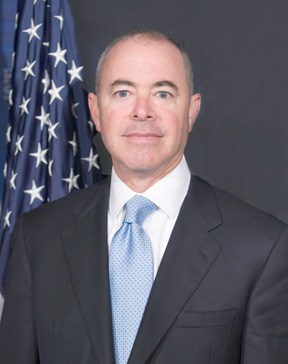Joe Biden’s Presumptive DHS Secretary: “I Am a Political Refugee”
Chris Roberts, American Renaissance, December 4, 2020

Alejandro Mayorkas
President-elect Joe Biden has begun announcing who he’d like in his administration, and his pick for the Department of Homeland Security (DHS) is Alejandro Mayorkas. Born in Cuba in 1959, his family immigrated to the US the next year — meaning he’d be the first immigrant ever to head DHS, a wing of the government that plays an enormous role in enforcing immigration law. Under President Barack Obama, Mr. Mayorkas served in similar positions: Director of United States Citizenship and Immigration Services (USCIS) from 2009 to 2013 and Deputy Secretary of Homeland Security from 2013 to 2016. Todd Bensman, a fellow at the Center for Immigration Studies, said that Mr. Mayorkas “was the architect of Obama’s Deferred Action for Childhood Arrivals (DACA) policy that legalized some 700,000 mostly adult ‘dreamers’ who arrived in the United States illegally as minors.” He also set up an “emergency relief program” after the 2010 earthquake in Haiti that made it easier for Haitians to come to the US.
In 2016, he spoke at the Immigration Law and Policy Conference and announced:
I’m a political refugee. I was born in Cuba and my parents brought my sister and me to this country to flee the Communist takeover of Cuba. . . . And my identity as a political refugee was extraordinarily important to my upbringing, and my parents were very focused on instilling in me a deep sense of what it means and what it meant to be a refugee, to be an individual displaced from one’s home and the country in which one’s parents dreamed of raising their children.
Later, when he spoke about identity, his conception was probably different from that of AmRen readers:
I just want to share a thought on the notion of identity, because it is identity that has to serve as the foundation of our approach to the difficult immigration issues that we confront. We have to give thought to the fundamental and foundational question of who we are as a country and who we should be and how we answer that question, on the subject of immigration, should be our guidepost in traveling through and managing the very very difficult and sensitive, and too often divisive challenges that we face.
In 2010, Mr. Mayorkas spoke about immigration at the New School in New York City: “The rhetoric around the issue is very troubling, but I remain optimistic that we will achieve comprehensive immigration reform. I think the need is dire for it.” Going into detail, he then explained that the US should encourage immigrant students to stay in the country after graduation. He also expressed an expansive view of chain migration: “The term ‘immediate relative’ means different things to different people in different parts of the world — I think our visa program is something that I would include in our discussion about comprehensive immigration reform.”
In the past, I have defended letting in white Cubans. Perhaps I was wrong.















